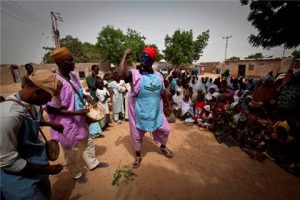Everyone’s effort is required to eradicate polio from Nigeria

UNICEF
6 April 2012 – “I really want to improve the health situation of all the children in my communities, by immunizing them against child killer diseases like polio,” says Saudutu, a 37-year-old vaccinator and mother of three children from Zamfara State, northern Nigeria.
During the multi-country polio vaccination campaigns that were held simultaneously across west and central Africa in early April, Saudutu started each day at 7am, travelling from house to house with the aim of reaching a total of 2,980 children with oral polio vaccine (OPV) over four days.
Meanwhile, community mobilizer Yusha’u travelled through the villages as part of Saudutu’s team. Carrying a megaphone, Yusha’u’s called out to the residents, telling them to bring out their children to be vaccinated. Yusha’u’s job is to is to reduce the number of missed children during the campaign and to increase the demand for and acceptance of OPV in the villages to which he’s assigned. As a father of six children, he knows the importance of immunization:
“This is the only way I can contribute to the well-being of my communities. I am trying to do my best to convince families to immunize their children”.
Right now, efforts are underway to recruit, train and deploy a further 2,150 volunteer mobilizers by May, to work as “change agents” in their communities, just like Yusha’u.
The efforts of people like Saudutu and Yusha’u are critical to the success of polio. They work long hours, through the heat of the day, to make sure that children are protected from polio.
At the other end of the spectrum is the highly technical deliberation that goes into ensuring that the efforts of the thousands of health workers and volunteers like Saudutu and Yusha’u are used to the greatest effect. Experts from Nigeria and around the world work together to ensure the country is operating under the best strategy possible to eradicate the disease.
The Expert Review Committee (ERC) for Nigeria – just one example of a forum for this technical deliberation – most recently met on the 28-29 March, in the lead-up to the multi-country campaigns. The committee of polio eradication experts met to discuss the current epidemiology and to analyse the effectiveness of the country’s National Polio Emergency Action Plan (NPEP).
The ERC found that polio cases are consistently being reported in eight states already identified as being at the highest risk, and the major reason for the country’s recent upsurge in cases is simply that too many children continue to be missed. More than 30% of children in the high-risk states of Borno, Kano, Sokoto and Yobe remain under-immunized, having received less than four doses of OPV. So far, only half of the 12 high-risk states in the north have convened a state-level polio task force, despite such task forces being seen as an integral part of the emergency action plan. However, the ERC applauded efforts to implement mechanisms for greater accountability, with oversight from the President.
The group concluded that Nigeria has the tools needed to eradicate polio, but that success relies on the full and consistent implementation of the NPEP.
Recommendations included calls for the scale-up of new innovations (including the Short Interval Additional Dose strategy), for more research to be conducted into both the operational and social reasons for children being missed, and for a surge in technical capacity.
Related:
To keep up-to-date with Nigeria’s polio eradication activities, please read UNICEF Nigeria’s newsletter:



